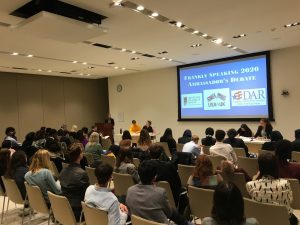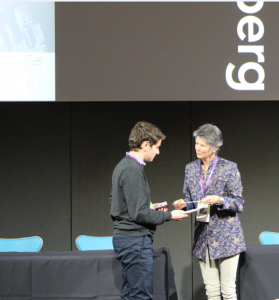Everyone knows the eerie, tinkling notes of the ‘Aquarium’ movement in Camille Saint-Saëns’ symphony for children, The Carnival of the Animals, even if we can’t name the music. But few people realise that the instrument which creates that other-worldly sound – also used in some renditions of the Harry Potter film music – was invented by Benjamin Franklin while living in London in 1761. And fewer still are aware of the role that Franklin’s instrument played in the strange story of hypnotism.
Franklin was inspired to create his glass armonica after hearing an English friend, Edward Delaval, playing a tune on wine glasses filled with water. Delaval was using the tried and tested technique, familiar to anyone who’s run out of things to say in the pub, of running a wet finger around the rim of a wine or beer glass to produce high-pitched ‘singing’. Franklin was convinced he could do better. With his typical ingenuity and attention to detail, he drew up an elaborate design and commissioned a London glassblower, Charles James, to create the first glass armonica.
Franklin’s armonica, also known as a glass harmonica, was made from 37 glass bowls of varying thicknesses and sizes threaded horizontally on an iron spindle which could be turned by a foot pedal. By moistening their fingers with water, a player could produce up to ten notes or chords at a time. The bowls were colour-coded for different notes. Franklin was delighted with the results. ‘Of all my inventions,’ he later said, ‘the glass armonica has given me the greatest personal satisfaction.’ Franklin’s instrument enjoyed its world premiere in 1762 and became hugely popular throughout Europe, inspiring compositions by celebrated musicians including Mozart.
Mozart first encountered the glass armonica in 1773 on a visit with his father to the house of a family friend, the physician Franz Anton Mesmer, in Vienna. After hearing the doctor play the instrument ‘unusually well’, the 16-year-old took a turn at tinkling the glasses himself. Mozart later wrote compositions, including his mournful Adagio for Glass Harmonica, for the instrument.
But it was Mozart’s host, Mesmer, who made the fullest use of the armonica’s ethereal qualities. Mesmer had studied medicine at the University of Vienna before settling in the city as a physician. Becoming disillusioned with orthodox medical therapies, such as bloodletting and blistering, Mesmer was eager to find alternatives. So when a fellow academic, the fabulously named Father Maximilian Hell, said he had cured his heartburn by applying magnets to his body, Mesmer was intrigued. He tried the method on his patients and was convinced he had discovered an invisible force which could be manipulated by magnets. He named this force ‘animal magnetism’. Abandoning magnets, Mesmer found that by using repetitive hand motions and strong vocal suggestions he could induce a kind of sleep in his patients. In this state, patients would slavishly follow his commands, lose their inhibitions and become insensitive to pain.
What Mesmer had stumbled upon, of course, was hypnotism. Although similar techniques had been used since ancient times to induce sleep-like states, Mesmer was the first to harness such methods systematically for medical purposes. Mesmer elevated his technique, which became known as ‘mesmerism, into an art form.
Settling in Paris in 1778, Mesmer became an overnight phenomenon. People flocked to his mesmerism salons where they would sit in a darkened room walled with mirrors as Mesmer, dressed in a flowing lilac robe, waved his hands to the accompaniment of the unearthly strains of his armonica. To treat more people at once, he had a tub or ‘baquet’ filled with water and iron filings. His patients, many of them wealthy ladies of leisure, sat around the tub and grasped one of the protruding iron rods. Handsome male assistants sat behind the patients and clasped them between their knees while applying ‘gentle pressure upon the breasts of the ladies’. According to one observer, ‘the cheeks of the ladies began to glow, their imaginations to become inflamed; and off they went, one after the other, in convulsive fits’.
Feted by Parisian society, including Marie Antoinette – herself a proficient armonica player – Mesmer amassed a fortune which was further increased as he sold his secret to eager disciples. But it was not long before his erotic exhibitions attracted the scorn of the French medical establishment who persuaded Louis XVI in 1784 to set up a royal commission to investigate mesmerism. The inquiry team comprised some of the most eminent scientific thinkers of the era, including Franklin, now aged 78, who was living in exile in France.
Meeting at Franklin’s house, the commission concluded that Mesmer’s invisible force did not exist and any benefit from his methods was due to ‘imagination’. Franklin’s musical invention had helped Mesmer create the highly-charged atmosphere at his mesmerism salons but Franklin’s intervention now helped to end Mesmer’s career. With his methods discredited, Mesmer left town, taking his armonica with him, and spent the rest of his life wandering Europe until he died in obscurity in 1815.
Mesmerism, however, flourished. It was introduced to Britain, by a second-generation disciple of Mesmer, in 1837 and was renamed hypnotism, by the Scottish physician James Braid, in 1841. After various resurgences, hypnotism remains popular today. Franklin’s armonica went on to inspire musical works by Beethoven, Donizetti and Richard Strauss as well as Saint-Saëns. In the early 19th century, however, the armonica fell from favour, partly fuelled by fears that its ghostly music could cause hallucinations and even madness.
Today a rare original armonica survives in the Franklin Institute in Philadelphia and a modern replica can be seen – and heard – at Benjamin Franklin House during Architectural Tours and group visits. And the mystical strains of the armonica are still occasionally produced in music by Bjork, David Gilmore and others.
This article is contributed by Wendy Moore – author, journalist, and one of our distinguished Literary Prize judges. Her most recent book Endell Street (UK)/No Man’s Land (US) is available to purchase online.

 Students were challenged to address questions relating to the environment, education, penal reform, internet safety and freedom of speech. Judges were impressed by the students’ level of preparation as well as their confidence and powers of persuasion.
Students were challenged to address questions relating to the environment, education, penal reform, internet safety and freedom of speech. Judges were impressed by the students’ level of preparation as well as their confidence and powers of persuasion. The winning in the junior category, Years 10&11, was Whitley Academy, represented by Duncan Van Den Top and Ciaran Wyllie (Ciaran was also the individual runner-up for this category). Daniel Fourman from Southbank International School won the individual prize for this category: a tour of the Houses of Parliament with the Rt Hon. Baroness Anelay of St Johns DBE – made possible with support from the DAR.
The winning in the junior category, Years 10&11, was Whitley Academy, represented by Duncan Van Den Top and Ciaran Wyllie (Ciaran was also the individual runner-up for this category). Daniel Fourman from Southbank International School won the individual prize for this category: a tour of the Houses of Parliament with the Rt Hon. Baroness Anelay of St Johns DBE – made possible with support from the DAR. The winning team in the senior category, Years 12&13, was Saint Cecelia’s Church of England School, represented by Benjamin Sturley and Agnes Moon. The individual runner-up for this category was Isabelle Lewitt from Southbank International School in Westminster. Agnes was awarded the individual prize and will be put forward as the US Embassy London’s nomination for the
The winning team in the senior category, Years 12&13, was Saint Cecelia’s Church of England School, represented by Benjamin Sturley and Agnes Moon. The individual runner-up for this category was Isabelle Lewitt from Southbank International School in Westminster. Agnes was awarded the individual prize and will be put forward as the US Embassy London’s nomination for the 


